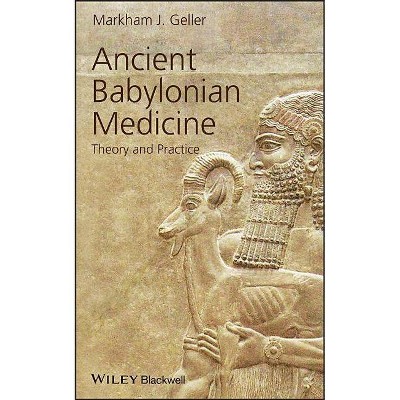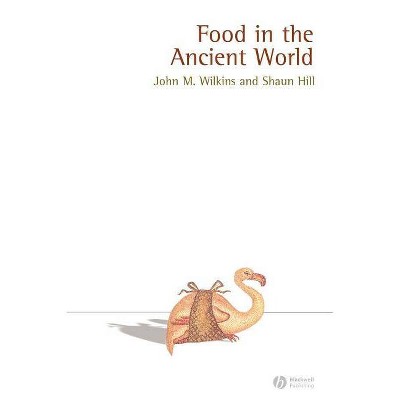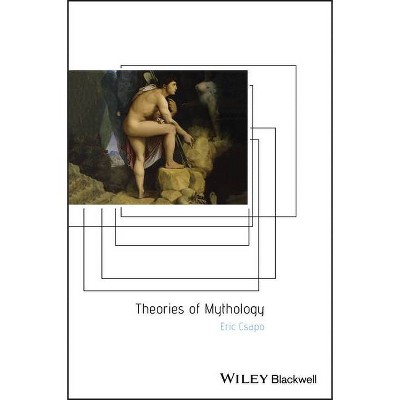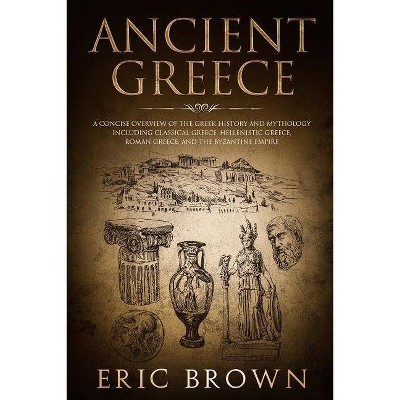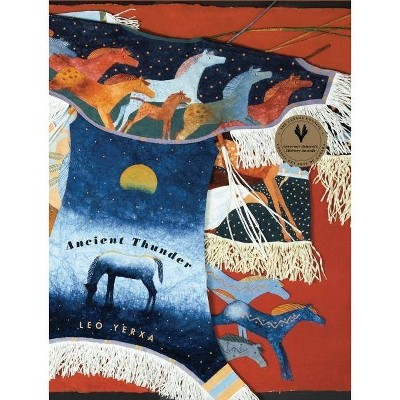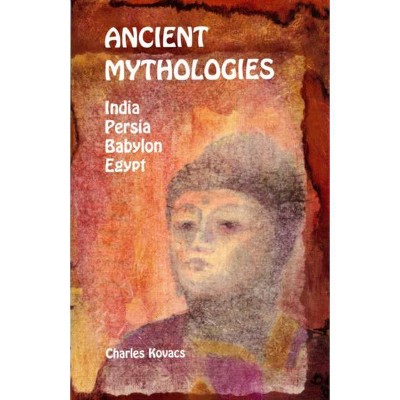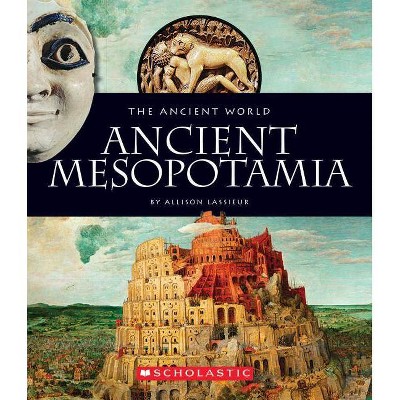Ancient Babylonian Medicine - (Ancient Cultures) by Markham J Geller (Paperback)
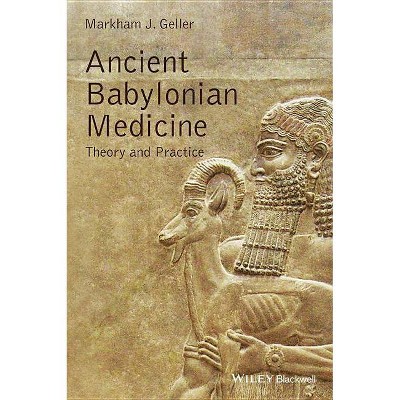
Similar Products
Products of same category from the store
AllProduct info
<p/><br></br><p><b> Book Synopsis </b></p></br></br>Utilizing a great variety of previously unknown cuneiform tablets, <i>Ancient Babylonian Medicine: Theory and Practice</i> examines the way medicine was practiced by various Babylonian professionals of the 2nd and 1st millennium B.C. <ul> <li>Represents the first overview of Babylonian medicine utilizing cuneiform sources, including archives of court letters, medical recipes, and commentaries written by ancient scholars</li> <li>Attempts to reconcile the ways in which medicine and magic were related</li> <li>Assigns authorship to various types of medical literature that were previously considered anonymous</li> <li>Rejects the approach of other scholars that have attempted to apply modern diagnostic methods to ancient illnesses</li> </ul><p/><br></br><p><b> From the Back Cover </b></p></br></br><p>Even in the twenty-first century, medicine remains something of a mystery. In a few significant areas we are hardly better informed than ancient and medieval practitioners. Yet when the topic of ancient medicine is broached, too often the tendency is to dismiss it solely as the product of ignorance and superstition. By delving into the way medicine was actually practiced by various Babylonian professionals of the 2nd and 1st millennium B.C., <i>Ancient Babylonian Medicine: Theory and Practice</i> shatters some of our preconceived notions about ancient medicine. Through the use of a great variety of extant cuneiform tablets -- many previously unknown -- noted Assyriologist and ancient language expert Markham J. Geller reveals the rich legacy of Babylonian healing techniques. Challenging the traditional view of ancient medicine that rigidly distinguishes between science and superstition, Geller shows how ancient healing methods and strategies embodied a vastly more complex relationship between medicine and magic. He theorizes that when viewed from the perspective of a patient concerned only with the efficacy of treatment, medicine and magic were simply dual approaches to healing. Geller also examines basic therapeutic concepts utilizing medical commentaries ascribed to physician-scribes among Babylonian scholars -- a source not previously researched. Original and provocative, <i>Ancient Babylonian Medicine: Theory and Practice</i> offers startling new insights into the dark and distant roots of modern medicine.</p><p/><br></br><p><b> Review Quotes </b></p></br></br><br><P>"Ancient Babylonian Medicineis an important and fascinating book which not only provides a much needed introduction to the theory and practice of medicine in ancient Mesopotamia but also makes a significant contribution to the study of ancient Mesopotamian scholarship. It is clearly and elegantly written, nicely illustrated, and well produced." ("Aestimatio", 1 June 2013) "This book is a rare achievement: as a scholarly work, it provides an important addition to the history of medicine; for the general reader, it is a fascinating introduction to the theory and practice of medicine in Mesopotamian society." (Antiquity Reviews, 2011)<P>"In sum, Geller has written a remarkably useful and thoughtful volume on what is an elusive topic. Assyriologists and historians of medicine will gain much from reading this work and it will certainly become required reading for the discipline." (Bryn Mawr Classical Review, 19 August 2011)<P>"Markham J. Geller brings a welcome, dual expertise now rather rare in medical history (he is an MD as well as a Rabbi and Professor of Semitic Languages), and some of his previous studies of Talmudic texts led him to the discovery of medical loan-words that turned out to be embedded Akka-dian dating from the period known as the "Babylonian Captivity." (Times Literary Supplement, 21 January 2011)<P>"He appends a commentary probably composed by the Uruk scholar Iqisa, who flourished in the latter part of the fourth century BC; the transcription, and possibly the translation, is from a 1924 edition by Campbell Thompson." ("SciTech Book News", December 2010)<br><br>"This book is a rare achievement: as a scholarly work, it provides an important addition to the history of medicine; for the general reader, it is a fascinating introduction to the theory and practice of medicine in Mesopotamian society." (Antiquity Reviews, 2011)<P>"In sum, Geller has written a remarkably useful and thoughtful volume on what is an elusive topic. Assyriologists and historians of medicine will gain much from reading this work and it will certainly become required reading for the discipline." (Bryn Mawr Classical Review, 19 August 2011)<P>"Markham J. Geller brings a welcome, dual expertise now rather rare in medical history (he is an MD as well as a Rabbi and Professor of Semitic Languages), and some of his previous studies of Talmudic texts led him to the discovery of medical loan-words that turned out to be embedded Akka-dian dating from the period known as the "Babylonian Captivity." (Times Literary Supplement, 21 January 2011)<P>"He appends a commentary probably composed by the Uruk scholar Iqisa, who flourished in the latter part of the fourth century BC; the transcription, and possibly the translation, is from a 1924 edition by Campbell Thompson." ("SciTech Book News", December 2010)<br><br>"In sum, Geller has written a remarkably useful and thoughtful volume on what is an elusive topic. Assyriologists and historians of medicine will gain much from reading this work and it will certainly become required reading for the discipline." (Bryn Mawr Classical Review, 19 August 2011)<P>"Markham J. Geller brings a welcome, dual expertise now rather rare in medical history (he is an MD as well as a Rabbi and Professor of Semitic Languages), and some of his previous studies of Talmudic texts led him to the discovery of medical loan-words that turned out to be embedded Akka-dian dating from the period known as the "Babylonian Captivity." (Times Literary Supplement, 21 January 2011)<P>"He appends a commentary probably composed by the Uruk scholar Iqisa, who flourished in the latter part of the fourth century BC; the transcription, and possibly the translation, is from a 1924 edition by Campbell Thompson." ("SciTech Book News", December 2010)<br><br>"Markham J. Geller brings a welcome, dual expertise now rather rare in medical history (he is an MD as well as a Rabbi and Professor of Semitic Languages), and some of his previous studies of Talmudic texts led him to the discovery of medical loan-words that turned out to be embedded Akka-dian dating from the period known as the "Babylonian Captivity." (Times Literary Supplement, 21 January 2011)<P>"He appends a commentary probably composed by the Uruk scholar Iqisa, who flourished in the latter part of the fourth century BC; the transcription, and possibly the translation, is from a 1924 edition by Campbell Thompson." ("SciTech Book News", December 2010)<br><br>"He appends a commentary probably composed by the Uruk scholar Iqisa, who flourished in the latter part of the fourth century BC; the transcription, and possibly the translation, is from a 1924 edition by Campbell Thompson." ("SciTech Book News", December 2010)<br><p/><br></br><p><b> About the Author </b></p></br></br><p><b>Markham J. Geller </b>is Professor of Semitic Languages at University College London and Professor for the History of Science at the Free University Berlin. He is the author <i>of Evil Demons: Canonical Utukkū Lemnūtu Incantations</i> (2007) and <i>Melothesia in Babylonia</i> (2014), editor of <i>Melammu, the Ancient World in an Age of Globalization</i> (2014), and co-editor of <i>Disease in Babylonia</i>(2007) and <i>Imagining Creation </i>(2008). </p>
Price History
Cheapest price in the interval: 36.25 on November 8, 2021
Most expensive price in the interval: 36.25 on December 20, 2021
Price Archive shows prices from various stores, lets you see history and find the cheapest. There is no actual sale on the website. For all support, inquiry and suggestion messages communication@pricearchive.us
